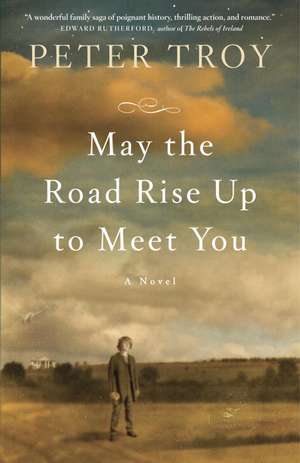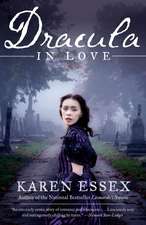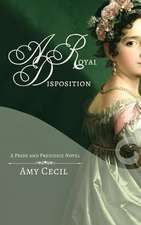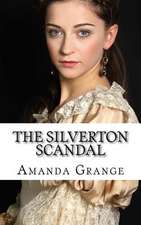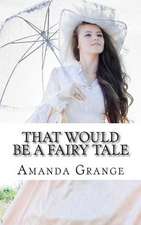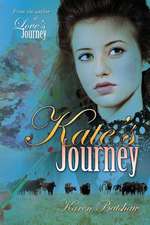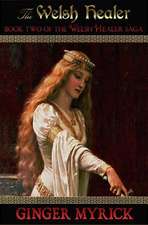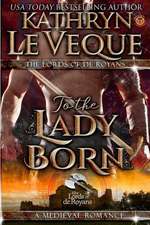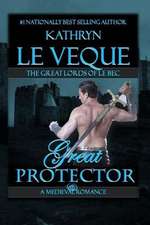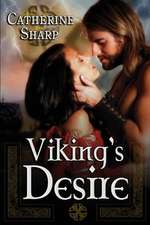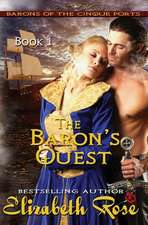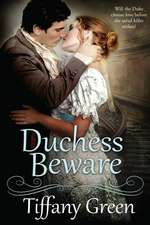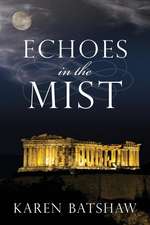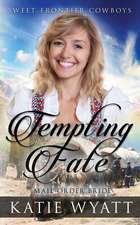May the Road Rise Up to Meet You
Autor Peter Troyen Limba Engleză Paperback – 12 noi 2012
Ethan McOwen survived the worst of the Irish Famine and made the treacherous crossing to America, but his endurance is tested by the rough neighborhoods of New York until he discovers a passion for photography; Marcella Arroyo arrives from Spain a high-spirited society girl but defies her father to become a devoted abolitionist; and slaves Mary and Micah plot a clandestine escape on a cold Christmas Eve in the hopes of finding a better future. When war brings them all together, it will dramatically change the course of their individual lives.
Preț: 132.88 lei
Nou
Puncte Express: 199
Preț estimativ în valută:
25.43€ • 27.61$ • 21.36£
25.43€ • 27.61$ • 21.36£
Carte disponibilă
Livrare economică 01-15 aprilie
Preluare comenzi: 021 569.72.76
Specificații
ISBN-13: 9780307743572
ISBN-10: 0307743578
Pagini: 494
Dimensiuni: 133 x 203 x 22 mm
Greutate: 0.36 kg
Editura: Anchor Books
ISBN-10: 0307743578
Pagini: 494
Dimensiuni: 133 x 203 x 22 mm
Greutate: 0.36 kg
Editura: Anchor Books
Notă biografică
PETER TROY is a former journalist and high school history teacher. He lives in New York State, where he is at work on his next novel.
Extras
1. The Hunger
Ethan McOwen
County Fermanagh, Ireland
April 25, 1847
Th’ Lahrd is my shepherd I shall not want . . . His Da had loved Father Laughton for the way he got through the Sunday Mass like a Protestant wit’ an overflowin’ bladder. That was always the kind of thing Da would have to say about the Father, even when his Mam’d go on about something the Father said in one of his three-minute sermons in the weekday Mass, Da would always say t’ank th’Lahrd we’ve got de only priest in Oireland that doesn’t run at th’mouth, or something like that. Seanny and Aislinn and Ethan’d laugh, and Mam’d slap Da’s shoulder and tell him, In fronta th’children? And he’d say, Sure they’re waitin’ t’get outta there as much as meself, and they’d laugh some more and Mam’d hit him again, only this time pressin’ back a smile of her own, tough as it was for her to stay mad when her family was laughin’ so.
But this service was a different matter and Ethan knew his Da wouldn’t be happy about the Father’s bladder today. Fer Chroist sakes Fadder, dat’s my little girl in dere, he’d say, wouldja slow it down a little? Or maybe Aislinn’d say, All due respect Fadder Laughton, but would ya please read wit’ some inflection, an’ make th’words come aloive? That’s what she was always tellin’ Ethan to do, and she’d say it to the Father in such a way that it wouldn’t be a mortal sin, and the Father’d laugh and say, Yer right, Aislinn dear, lemme give it anudder go, and he’d smile and pat her on the head and go back to readin’, slower this time, and with more meaning. Ethan wished he could say something in his sister’s place, but he’d just sound like an insolent little boy, and he didn’t want to go sinning like that, placin’ his immortal soul in jeopardy and givin’ his Mam something else to worry about. So he stood quietly, thinkin’ of what a shame it was that the last words spoken for Aislinn’d be like this.
He stared down at the hole in the ground and admired the precision of its edges, cut perfectly straight and square to one another, with the displaced earth stacked in two neat pyramids at either end of it. He knew that had his and Aislinn’s places been switched, and the fever’d overtaken him instead of her, she would’ve appreciated the craftsmanship, too. But it was his sister’s undersize coffin layin’ comfortably inside the hole, not his, and he tried not to think about how they’d had to bend her legs at the knees, then fold them back behind her, so she’d fit in the four-foot-long box made for a child half her age. At least it’d keep the dogs off her better than one of those government-issue wool sacks, the ones the poorest families were left with, the ones they’d later have to see torn from the ground and ripped to shreds as the dogs and rats got at what was left of their loved one. There’d be none of that for Aislinn, because the eight and sixpence his Da and Seanny had sent from America, the money that was to go for food until the new potatoes in July, bought the coffin and the slate and the Mass to be said in her name, instead.
When The Hunger claimed the first of its victims, most of the village turned out for the services after the Sunday Mass, but now it’d just be family members and perhaps a few friends. Still, Ethan counted forty-one, not includin’ Aislinn, here this mornin’, a testament to his sister’s gentle and encouraging nature and the dozen or so children along the Lane she’d taught to read in the past few years. Even Old Mr. Hanratty was here, standin’ alone, perhaps fifteen feet behind the Bresnihans. Ethan knew this was as close as he’d been to the inside of a church in thirty years, so he nodded his head to him in confused gratitude, and Mr. Hanratty, tight-lipped, nodded back.
Aislinn’s service was done in ten minutes and the two gravediggers began to spill the neatly piled dirt on top of her coffin as his Mam and Aunt Emily wept. Ethan looked away after just a moment, not wantin’ the water to get in his eyes the way it was in his Mam’s and Aunt Em’s. He noticed how most of the older graves had tombstones that stood upright while the newer ones were marked with about what Aislinn’d have, a one-inch-thick slate, fourteen by ten inches, lyin’ flat on the ground. That was all there’d be to tell anyone who might be interested that she’d been here for almost sixteen years, and that she wanted to be a teacher, and how, for the last two years, since it was just her and him and Mam livin’ at Aunt Em’s, she and he would put on shows every Saturday night, and oh were they gettin’ so good at it. No, none of that at all. Instead all it read was . . .
Aislinn McOwen
1831ߝ1847
. . . as if a few numbers said anything about her, like it was some sort of achievement how long a person lived, and when they’d died young, like Aislinn, people fifty years from now could look at the numbers and say, Oh poor lass, just sixteen what a pity, what a tragedy, musta been The Hunger. Most of the stones that were laid flat across the graveyard were covered over with grass and weeds, and Ethan vowed that he wouldn’t let the same thing happen to her. He wouldn’t let her fade away like that.
The crowd quickly dispersed, with only a few people comin’ by and nodding their sorrow or placin’ a hand briefly on his Mam’s shoulder. Father Laughton was one of the last to approach. He may not have read with much inflection, Ethan thought, but the Father’s pain was written on his face in deep creases that led to sunken eyes, and Ethan realized then that the Father’d seen more death than any of them.
May th’ Lahrd comfort you, he said to the three of them, and waved his hand in a downward line and then across.
He was gone before any of them could say a word, though both his Mam and Aunt Em blessed themselves and curtseyed. And then it was just the three of them standin’ beside the gravesite, with a few stragglers a little farther away.
Jaysus, me hands’re just about tahrn up from all dis rocky soil, one of the gravediggers said. It’s loike shovelin’ bricks.
Ahh yer always complainin’, the other replied. Yer hands can’t be bad as me back.
They were strangers to Ethan, men who traveled constantly, earning a shilling here and there, plyin’ their morbid trade like vultures in the Irish countryside. He could hear every word they said, and regardless of what a fine job they’d done diggin’ the grave, he wanted to take the shovels from them and cover his sister’s body himself. If his Da and Seanny were here, they’d probably want to take the shovels and bash the gravediggers over the head, he figured, so he felt a little ashamed, less of a man, for not wantin’ to do so as well.
Mam and Aunt Em closed their eyes as the coffin disappeared beneath the dirt, them without an extra penny for the gravediggers and so forced to hear more about various aches and pains as the men carried out their work. Ethan felt the anger grow within him until Mr. Hanratty walked up to each of the men and handed them a coin and whispered something to them while noddin’ toward Ethan’s Mam. The men continued on with their work in silence, and Mr. Hanratty glanced over at Ethan and his Mam and Aunt, placin’ his gray woolen cap against his heart and nodding his head slightly. Then, without a word, he was off.
When the coffin was completely covered and the tombstone set in place on the fresh dirt, the three of them walked quietly home. To Ethan, the lustrous green fields were now gray as a winter sky, and their cottage seemed as vast and hollow inside as a fourteen-by-sixteen-foot space could ever seem. There’d be no grand funeral dinner, as was the custom in the Old Days. There’d be no reveling, no cousins runnin’ about in the fields as the men and women sat inside by the fire and drank a few pints Old Man McGeary’d supplied from his pub down the Lane. There’d be no stories told of the person who’d passed, no fiddle, or singing. No laughter.
Ethan realized that it was exactly one week ago, when he returned home from the Mass with Aunt Em, that they were told by his cryin’ Mam that Aislinn was gone. Now, as he’d done then, he bounded up the stepladder to the loft he’d shared with his sister since they moved in two years earlier, once Sean and Da were off to America. He sat on his bed, two five-by-one-foot wooden planks raised just off the floor by corner posts. Aislinn’s bed was across from it, the two of them separated by their collection of eleven books stacked neatly on a small plank, held up on either side by painted rocks used for bookends. They called it The Library. The first six volumes’d been given to Aislinn when she saw them piled beside the trash bin in the Brodericks’ library and Mr. Broderick caught her skimmin’ through them. Since that time he’d given her five more, and she and Ethan had read them all several times, though she generally had to help him with some of the more challenging ones like Paradise Lost and a collection of the Shakespeare.
Every Saturday night, until two weeks ago, the two of them took a scene from one of their books and acted it out for Mam and Aunt Em, often taking what Aislinn called poetic license with the tragic scenes, much to the approval of their audience. Loud applause always greeted them when Hamlet, or Achilles, or Romeo and Juliet, or other doomed heroes were spared in the end. But even the happy memories brought the water to his eyes now, so he left the books in their place and took a minute to fully compose himself before going back down the ladder.
His Mam and Aunt Em were busy cooking the biggest feast they’d seen since Christmas. There’d be three small turnips, a little cabbage and wheat flour bread, and as a special treat, they’d each get a few ounces of beef cut from the scraps fed to the Brodericks’ dogs. Aunt Emily had cut it and stuffed it in her pocket when nobody was lookin’—she called it Aislinn’s severance, whatever that meant—and he knew that this funeral supper would chase away The Hunger for at least one night. But when it was ready they ate in virtual silence, chewing everything slowly, tryin’ to make it last as long as possible. Ethan felt terribly guilty and he was sure his Mam and Aunt felt so too. Aislinn hadn’t eaten a meal like this for the last few months of her life, and the only reason each of them had so much now was because there were only three of them left to eat it. And so, as the food hit his empty belly, he found none of the usual satisfaction or relief, only shame.
That night, sleeplessly staring around the darkness, he could tell when Mam or Aunt Em were awake by the sounds of their sniffles. And much as he tried not to, his thoughts wandered to that day, just three Saturdays ago, and the last time he and Aislinn had performed one of their scenes. He’d rushed home that day with nothin’ more than a quick wave to Mr. Hanratty, carryin’ the usual pocketful of oats and even more of a bounty in his other pocket, four pieces of jerky that Mr. Broderick’d given him for stayin’ late. It wasn’t like he’d had any choice but to stay, what with Mr. Broderick and his daughters still out there ridin’, but it was a nice thing he’d done all the same. It made Ethan feel even guiltier than usual about taking the pocketful of oats, even though Aunt Em always said it wasn’t really stealin’, just doin’ the Lahrds work for Him, feedin’ th’poor and such, like th’loaves an’ fishes in th’Bible. But his guilt quickly faded when he reached home that evening since it was Saturday night and Aislinn’d already picked out a scene for the play.
Sure, it turned out to be the last time she’d been anything like herself, but Ethan let the thoughts press fully on him now, as if to give her the proper sort of remembrance the dead should have no matter how much it hurts the ones left behind. And this wistful recollection gave way to the dreams that linger on the edge of sleep, needing only to close his eyes to be taken fully back into the moment . . .
I was thinkin’ we’d do a bit from The Odyssey, she says as soon as you hit the top step to the loft. I think I can read for ya, but you’ll havta do th’performin’.
She seems weaker than she’d been just that mornin’, but you’ll not mention anything of it.
What part? you ask and even start gettin’ a little worried about the idea of doing your first solo.
When Odysseus is given the bag t’contain all th’winds so dey can make it home t’Ithaca, she says. And then you remember the jerky in your pocket, and hold the four pieces up to her, proud as can be.
Where’d ya get them? she asks, smilin’.
Mr. Broderick gave ’em t’me for stayin’ late, you say, like you’ve done somethin’ important to earn them. You can have mine Ais’.
Ahhh no, Ethan, she says wavin’ her hand. One’s plenty.
It doesn’t matter anyway since Mam cooks the jerky in the soup for supper. And you’re all excited to taste the flavor of beef again, even though you’re thirsty afterwards from the salt. Then Mam and Aunt Em settle in their stools and Aislinn lies in Mam’s bed with The Odyssey out and open before her. You go up to get your blanket, then step outside, while Aislinn sets the scene, talkin’ about how Odysseus was given this great sack to hold all the winds of the seas. And when you come back in, you bounce all around the cottage, like a man holdin’ the winds in a sack’d do. You bounce from side to side of the cabin, and they all laugh, Aislinn even, and the more you swoon, the more they laugh, so you swoon even more. After a minute or two of that, you, Odysseus, settle down to sleep. And Aislinn reads on, about how the members of his ship’s crew talk of the treasure they think Odysseus is keeping hidden from them in the sack.
From the Hardcover Edition
Ethan McOwen
County Fermanagh, Ireland
April 25, 1847
Th’ Lahrd is my shepherd I shall not want . . . His Da had loved Father Laughton for the way he got through the Sunday Mass like a Protestant wit’ an overflowin’ bladder. That was always the kind of thing Da would have to say about the Father, even when his Mam’d go on about something the Father said in one of his three-minute sermons in the weekday Mass, Da would always say t’ank th’Lahrd we’ve got de only priest in Oireland that doesn’t run at th’mouth, or something like that. Seanny and Aislinn and Ethan’d laugh, and Mam’d slap Da’s shoulder and tell him, In fronta th’children? And he’d say, Sure they’re waitin’ t’get outta there as much as meself, and they’d laugh some more and Mam’d hit him again, only this time pressin’ back a smile of her own, tough as it was for her to stay mad when her family was laughin’ so.
But this service was a different matter and Ethan knew his Da wouldn’t be happy about the Father’s bladder today. Fer Chroist sakes Fadder, dat’s my little girl in dere, he’d say, wouldja slow it down a little? Or maybe Aislinn’d say, All due respect Fadder Laughton, but would ya please read wit’ some inflection, an’ make th’words come aloive? That’s what she was always tellin’ Ethan to do, and she’d say it to the Father in such a way that it wouldn’t be a mortal sin, and the Father’d laugh and say, Yer right, Aislinn dear, lemme give it anudder go, and he’d smile and pat her on the head and go back to readin’, slower this time, and with more meaning. Ethan wished he could say something in his sister’s place, but he’d just sound like an insolent little boy, and he didn’t want to go sinning like that, placin’ his immortal soul in jeopardy and givin’ his Mam something else to worry about. So he stood quietly, thinkin’ of what a shame it was that the last words spoken for Aislinn’d be like this.
He stared down at the hole in the ground and admired the precision of its edges, cut perfectly straight and square to one another, with the displaced earth stacked in two neat pyramids at either end of it. He knew that had his and Aislinn’s places been switched, and the fever’d overtaken him instead of her, she would’ve appreciated the craftsmanship, too. But it was his sister’s undersize coffin layin’ comfortably inside the hole, not his, and he tried not to think about how they’d had to bend her legs at the knees, then fold them back behind her, so she’d fit in the four-foot-long box made for a child half her age. At least it’d keep the dogs off her better than one of those government-issue wool sacks, the ones the poorest families were left with, the ones they’d later have to see torn from the ground and ripped to shreds as the dogs and rats got at what was left of their loved one. There’d be none of that for Aislinn, because the eight and sixpence his Da and Seanny had sent from America, the money that was to go for food until the new potatoes in July, bought the coffin and the slate and the Mass to be said in her name, instead.
When The Hunger claimed the first of its victims, most of the village turned out for the services after the Sunday Mass, but now it’d just be family members and perhaps a few friends. Still, Ethan counted forty-one, not includin’ Aislinn, here this mornin’, a testament to his sister’s gentle and encouraging nature and the dozen or so children along the Lane she’d taught to read in the past few years. Even Old Mr. Hanratty was here, standin’ alone, perhaps fifteen feet behind the Bresnihans. Ethan knew this was as close as he’d been to the inside of a church in thirty years, so he nodded his head to him in confused gratitude, and Mr. Hanratty, tight-lipped, nodded back.
Aislinn’s service was done in ten minutes and the two gravediggers began to spill the neatly piled dirt on top of her coffin as his Mam and Aunt Emily wept. Ethan looked away after just a moment, not wantin’ the water to get in his eyes the way it was in his Mam’s and Aunt Em’s. He noticed how most of the older graves had tombstones that stood upright while the newer ones were marked with about what Aislinn’d have, a one-inch-thick slate, fourteen by ten inches, lyin’ flat on the ground. That was all there’d be to tell anyone who might be interested that she’d been here for almost sixteen years, and that she wanted to be a teacher, and how, for the last two years, since it was just her and him and Mam livin’ at Aunt Em’s, she and he would put on shows every Saturday night, and oh were they gettin’ so good at it. No, none of that at all. Instead all it read was . . .
Aislinn McOwen
1831ߝ1847
. . . as if a few numbers said anything about her, like it was some sort of achievement how long a person lived, and when they’d died young, like Aislinn, people fifty years from now could look at the numbers and say, Oh poor lass, just sixteen what a pity, what a tragedy, musta been The Hunger. Most of the stones that were laid flat across the graveyard were covered over with grass and weeds, and Ethan vowed that he wouldn’t let the same thing happen to her. He wouldn’t let her fade away like that.
The crowd quickly dispersed, with only a few people comin’ by and nodding their sorrow or placin’ a hand briefly on his Mam’s shoulder. Father Laughton was one of the last to approach. He may not have read with much inflection, Ethan thought, but the Father’s pain was written on his face in deep creases that led to sunken eyes, and Ethan realized then that the Father’d seen more death than any of them.
May th’ Lahrd comfort you, he said to the three of them, and waved his hand in a downward line and then across.
He was gone before any of them could say a word, though both his Mam and Aunt Em blessed themselves and curtseyed. And then it was just the three of them standin’ beside the gravesite, with a few stragglers a little farther away.
Jaysus, me hands’re just about tahrn up from all dis rocky soil, one of the gravediggers said. It’s loike shovelin’ bricks.
Ahh yer always complainin’, the other replied. Yer hands can’t be bad as me back.
They were strangers to Ethan, men who traveled constantly, earning a shilling here and there, plyin’ their morbid trade like vultures in the Irish countryside. He could hear every word they said, and regardless of what a fine job they’d done diggin’ the grave, he wanted to take the shovels from them and cover his sister’s body himself. If his Da and Seanny were here, they’d probably want to take the shovels and bash the gravediggers over the head, he figured, so he felt a little ashamed, less of a man, for not wantin’ to do so as well.
Mam and Aunt Em closed their eyes as the coffin disappeared beneath the dirt, them without an extra penny for the gravediggers and so forced to hear more about various aches and pains as the men carried out their work. Ethan felt the anger grow within him until Mr. Hanratty walked up to each of the men and handed them a coin and whispered something to them while noddin’ toward Ethan’s Mam. The men continued on with their work in silence, and Mr. Hanratty glanced over at Ethan and his Mam and Aunt, placin’ his gray woolen cap against his heart and nodding his head slightly. Then, without a word, he was off.
When the coffin was completely covered and the tombstone set in place on the fresh dirt, the three of them walked quietly home. To Ethan, the lustrous green fields were now gray as a winter sky, and their cottage seemed as vast and hollow inside as a fourteen-by-sixteen-foot space could ever seem. There’d be no grand funeral dinner, as was the custom in the Old Days. There’d be no reveling, no cousins runnin’ about in the fields as the men and women sat inside by the fire and drank a few pints Old Man McGeary’d supplied from his pub down the Lane. There’d be no stories told of the person who’d passed, no fiddle, or singing. No laughter.
Ethan realized that it was exactly one week ago, when he returned home from the Mass with Aunt Em, that they were told by his cryin’ Mam that Aislinn was gone. Now, as he’d done then, he bounded up the stepladder to the loft he’d shared with his sister since they moved in two years earlier, once Sean and Da were off to America. He sat on his bed, two five-by-one-foot wooden planks raised just off the floor by corner posts. Aislinn’s bed was across from it, the two of them separated by their collection of eleven books stacked neatly on a small plank, held up on either side by painted rocks used for bookends. They called it The Library. The first six volumes’d been given to Aislinn when she saw them piled beside the trash bin in the Brodericks’ library and Mr. Broderick caught her skimmin’ through them. Since that time he’d given her five more, and she and Ethan had read them all several times, though she generally had to help him with some of the more challenging ones like Paradise Lost and a collection of the Shakespeare.
Every Saturday night, until two weeks ago, the two of them took a scene from one of their books and acted it out for Mam and Aunt Em, often taking what Aislinn called poetic license with the tragic scenes, much to the approval of their audience. Loud applause always greeted them when Hamlet, or Achilles, or Romeo and Juliet, or other doomed heroes were spared in the end. But even the happy memories brought the water to his eyes now, so he left the books in their place and took a minute to fully compose himself before going back down the ladder.
His Mam and Aunt Em were busy cooking the biggest feast they’d seen since Christmas. There’d be three small turnips, a little cabbage and wheat flour bread, and as a special treat, they’d each get a few ounces of beef cut from the scraps fed to the Brodericks’ dogs. Aunt Emily had cut it and stuffed it in her pocket when nobody was lookin’—she called it Aislinn’s severance, whatever that meant—and he knew that this funeral supper would chase away The Hunger for at least one night. But when it was ready they ate in virtual silence, chewing everything slowly, tryin’ to make it last as long as possible. Ethan felt terribly guilty and he was sure his Mam and Aunt felt so too. Aislinn hadn’t eaten a meal like this for the last few months of her life, and the only reason each of them had so much now was because there were only three of them left to eat it. And so, as the food hit his empty belly, he found none of the usual satisfaction or relief, only shame.
That night, sleeplessly staring around the darkness, he could tell when Mam or Aunt Em were awake by the sounds of their sniffles. And much as he tried not to, his thoughts wandered to that day, just three Saturdays ago, and the last time he and Aislinn had performed one of their scenes. He’d rushed home that day with nothin’ more than a quick wave to Mr. Hanratty, carryin’ the usual pocketful of oats and even more of a bounty in his other pocket, four pieces of jerky that Mr. Broderick’d given him for stayin’ late. It wasn’t like he’d had any choice but to stay, what with Mr. Broderick and his daughters still out there ridin’, but it was a nice thing he’d done all the same. It made Ethan feel even guiltier than usual about taking the pocketful of oats, even though Aunt Em always said it wasn’t really stealin’, just doin’ the Lahrds work for Him, feedin’ th’poor and such, like th’loaves an’ fishes in th’Bible. But his guilt quickly faded when he reached home that evening since it was Saturday night and Aislinn’d already picked out a scene for the play.
Sure, it turned out to be the last time she’d been anything like herself, but Ethan let the thoughts press fully on him now, as if to give her the proper sort of remembrance the dead should have no matter how much it hurts the ones left behind. And this wistful recollection gave way to the dreams that linger on the edge of sleep, needing only to close his eyes to be taken fully back into the moment . . .
I was thinkin’ we’d do a bit from The Odyssey, she says as soon as you hit the top step to the loft. I think I can read for ya, but you’ll havta do th’performin’.
She seems weaker than she’d been just that mornin’, but you’ll not mention anything of it.
What part? you ask and even start gettin’ a little worried about the idea of doing your first solo.
When Odysseus is given the bag t’contain all th’winds so dey can make it home t’Ithaca, she says. And then you remember the jerky in your pocket, and hold the four pieces up to her, proud as can be.
Where’d ya get them? she asks, smilin’.
Mr. Broderick gave ’em t’me for stayin’ late, you say, like you’ve done somethin’ important to earn them. You can have mine Ais’.
Ahhh no, Ethan, she says wavin’ her hand. One’s plenty.
It doesn’t matter anyway since Mam cooks the jerky in the soup for supper. And you’re all excited to taste the flavor of beef again, even though you’re thirsty afterwards from the salt. Then Mam and Aunt Em settle in their stools and Aislinn lies in Mam’s bed with The Odyssey out and open before her. You go up to get your blanket, then step outside, while Aislinn sets the scene, talkin’ about how Odysseus was given this great sack to hold all the winds of the seas. And when you come back in, you bounce all around the cottage, like a man holdin’ the winds in a sack’d do. You bounce from side to side of the cabin, and they all laugh, Aislinn even, and the more you swoon, the more they laugh, so you swoon even more. After a minute or two of that, you, Odysseus, settle down to sleep. And Aislinn reads on, about how the members of his ship’s crew talk of the treasure they think Odysseus is keeping hidden from them in the sack.
From the Hardcover Edition
Recenzii
“Beautifully told, Troy has given us a story that will be with me for many years to come.” —Robert Hicks, author of The Widow of the South
“A wonderful family saga of poignant history, thrilling action, and romance.” —Edward Rutherfurd, author of The Rebels of Ireland
“Finding ambition in a first novel is not a rare thing, but to find it fulfilled as thoroughly as it is in May the Road Rise Up to Meet You is indeed something special.” —The Free Lance-Star
“To read this book is an enriching, unforgettable experience. It is told in utterly true and authentic voices that reach the soul and linger in the heart.” —Leila Meacham, author of Roses
“May the Road Rise up to Meet You is a rich look at the boiling melting pot that was Civil War-era New York.” —Newark Star-Ledger
“A classic tale that feels equally Irish and American.” —BookPage
“May the Road Rise Up to Meet You is a generous and sweeping Civil War saga about Southern slaves and newly arrived immigrants linked by a shared desire for abolition and freedom. Ranging from the clawing hunger of the Irish Famine to the abusive captivity of South Carolina, from rough-and-tumble Five Points to the genteel streets of Richmond, Virginia, this affecting and moving tale links disparate lives of impressive integrity, suffering and triumph, and yields a deeply personal portrait of the immigrants who fought the war and the people they fought it for. A hopeful, magnanimous depiction of America at its most vulnerable.” —Robin Oliveira, author of My Name is Mary Sutter, winner of the Shaara Prize for Excellence in Civil War Fiction
“The depth of Troy’s characters offers compelling insights into the Civil War era.” —Publishers Weekly
“Troy has written a heartfelt and moving saga of America's most fateful hour.” —California Literary Review
“A wonderful family saga of poignant history, thrilling action, and romance.” —Edward Rutherfurd, author of The Rebels of Ireland
“Finding ambition in a first novel is not a rare thing, but to find it fulfilled as thoroughly as it is in May the Road Rise Up to Meet You is indeed something special.” —The Free Lance-Star
“To read this book is an enriching, unforgettable experience. It is told in utterly true and authentic voices that reach the soul and linger in the heart.” —Leila Meacham, author of Roses
“May the Road Rise up to Meet You is a rich look at the boiling melting pot that was Civil War-era New York.” —Newark Star-Ledger
“A classic tale that feels equally Irish and American.” —BookPage
“May the Road Rise Up to Meet You is a generous and sweeping Civil War saga about Southern slaves and newly arrived immigrants linked by a shared desire for abolition and freedom. Ranging from the clawing hunger of the Irish Famine to the abusive captivity of South Carolina, from rough-and-tumble Five Points to the genteel streets of Richmond, Virginia, this affecting and moving tale links disparate lives of impressive integrity, suffering and triumph, and yields a deeply personal portrait of the immigrants who fought the war and the people they fought it for. A hopeful, magnanimous depiction of America at its most vulnerable.” —Robin Oliveira, author of My Name is Mary Sutter, winner of the Shaara Prize for Excellence in Civil War Fiction
“The depth of Troy’s characters offers compelling insights into the Civil War era.” —Publishers Weekly
“Troy has written a heartfelt and moving saga of America's most fateful hour.” —California Literary Review
